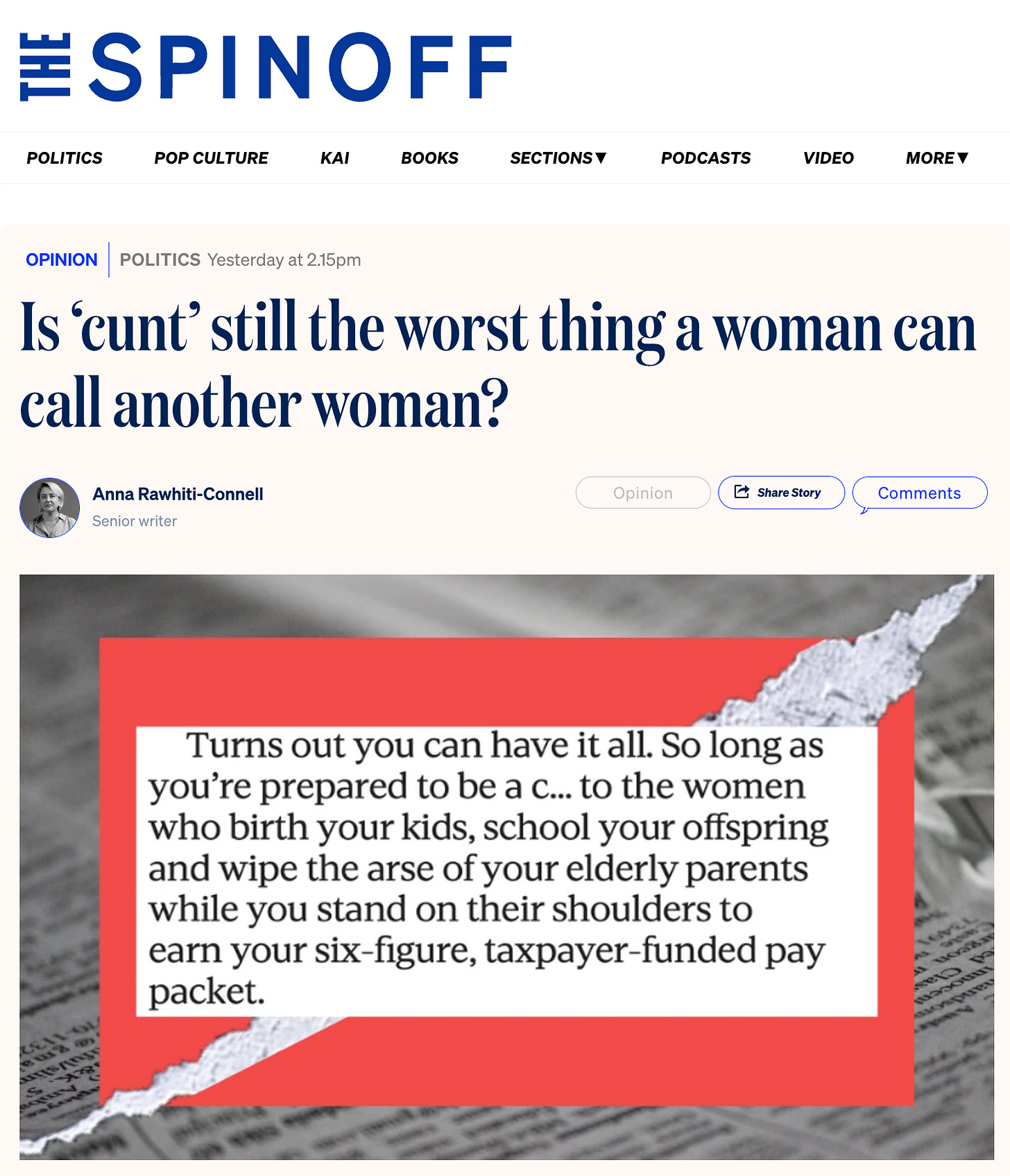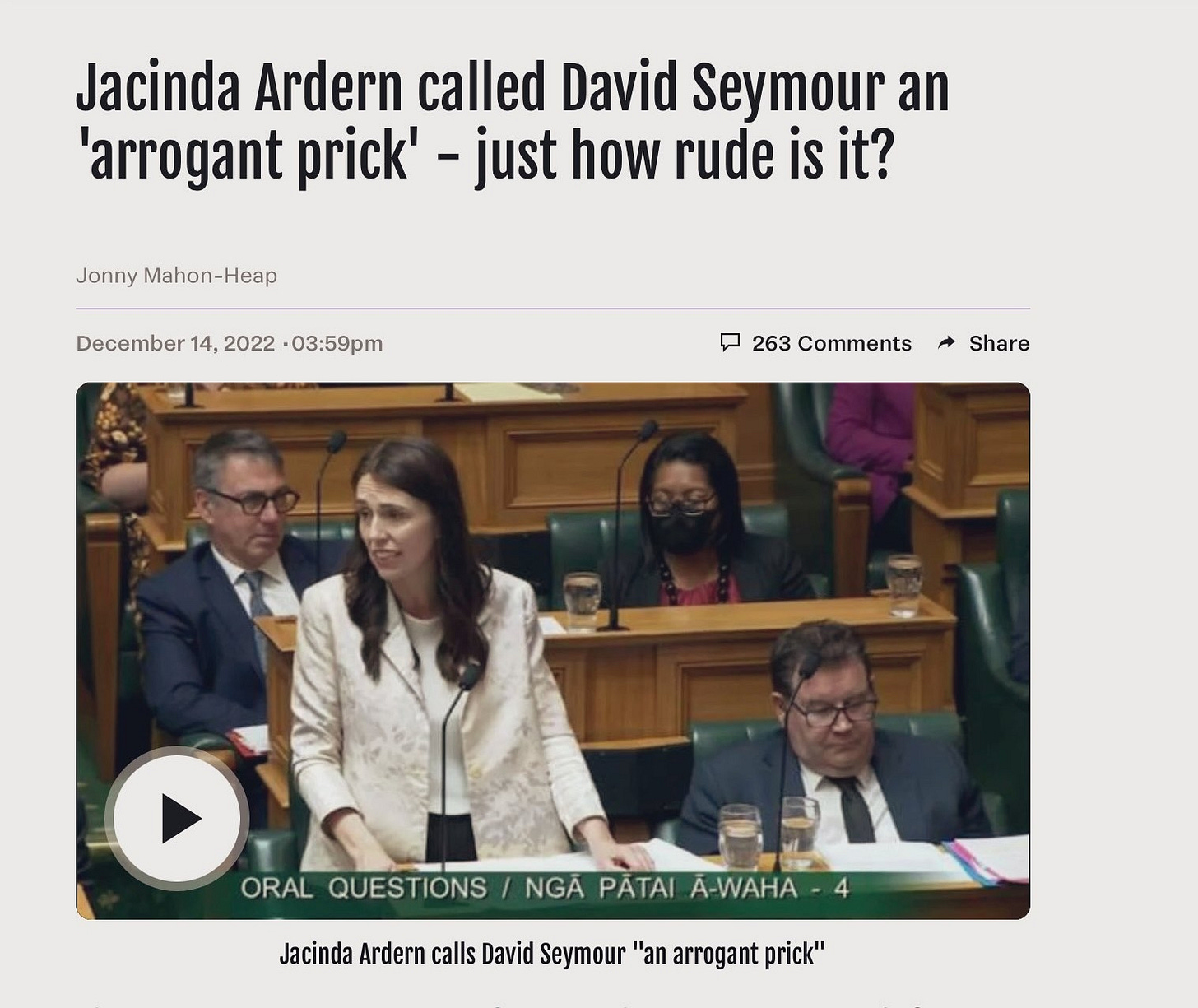What happens when you call a female MP a 'c**t' (part 2)
Turns out there's a lot of reaction, but no consequences.
Yesterday I wrote this about Andrea Vance, a senior Wellington journalist, who herself had written an opinion piece in The Post and the Sunday Star-Times over the weekend.
In it, she addressed the Finance Minister Nicola Willis and five of her female colleagues with the C-word:
Predictably the whole story has drawn a lot of reaction. And although I shouldn’t be, I’m still surprised and shocked at the attitude being taken by those at the centre of the issue, and in the wider media.
Let’s start with Stuff, the parent company of those newspapers.
In a statement to the New Zealand Herald, a Stuff spokesperson said:
“The issue of pay equity has caused robust debate.
This is not the first time our editors have allowed the use of this word – it is carefully reviewed by experienced editors and on this occasion it was decided it was acceptable usage in this context.
Andrea Vance, and her editor Tracy Watkins, are two of the country’s foremost political writers. Stuff has also published a spectrum of views on this issue, including today from the Minister of Finance.”
In other words, what our reporter did was fine.
We’ve done this before, and it’s a non-issue.
Not even a hint of an apology for calling a woman (who also happens to be an elected official) one of the most offensive slurs there is. Not even a “we’re sorry if some people have been offended”.
Nothing.
Instead, it’s almost a rebuke to people who ARE offended. Our journalists and editors are experienced and reputable, so their decisions don’t need to be reviewed. Just calm down, people - WE know what’s right.
Then The Spinoff went all-in with a defence of the use of word, whilst also deciding to drop all pretence as well as the asterisks:
Senior writer Anna Rawhiti-Connell’s argument appeared to be that the word is widely-used and also appropriate in the circumstances (emphasis added):
Within the context of Vance’s column, cunt is clearly being used as a pejorative. Some might argue that in the context of a woman writing about actions taken by women in power to shift the goalposts on women with less power, it was a potent deployment of a word that maintains its shock value despite common usage and its complicated coat of many connotations.
So the focus here appears to be on context, which I always advocate for.
And you see this in much of the public comment too - that the actions taken by Nicola Willis (in cancelling the pay equity claims of hundreds of thousands of women) justify the use of the C-word. It’s not just a random insult, they say, because what she is doing is… erm, a bit c***ty?
(Not ‘catty’, for the record.)
But then the piece concludes with this:
I would rather be called a stupid bitch than a cunt. I also wouldn’t call someone else a cunt in such a public way. But stupid bitch wouldn’t work as well in Vance’s column. It’s cruel but lacks bite in this gendered context. If you get to drop one shocking word bomb during your career, Vance has chosen correctly.
So now it’s a discussion over which insult sounds better? Really?
Again what is surprising (or maybe just shocking) is that neither this opinion piece, nor the comment from Stuff, acknowledges that a journalist has chosen to publicly insult another person.
Journalists rightly complain about being targeted with abuse, but apparently it’s okay to dish it out? There is almost no acknowledgement that Vance verbally attacked the Finance Minister in her piece, and did so with a particularly nasty slur.
(And I’ll say it again - a male journalist would have been destroyed for describing a woman with that word. Absolutely destroyed.)
Rawhiti-Connell’s reference to the insult ‘stupid bitch’ is very purposeful.
Because back in November 2024, this was this story about one of the women who was included in Vance’s article:
It was (rightly?) headline news. Mainstream media fuelled the outrage, and Stanford apologised.
But only a week earlier, the leader of the Māori Party Rawiri Waititi addressed the leader of the ACT Party, David Seymour, with a euphemism for the word ‘c**t’.
For some reason, that one didn’t break through into the mainstream, and was confined mostly to social media.
But then rewind a couple more years, when then-Prime Minister Jacinda Ardern was caught on a microphone calling David Seymour (again!) an “arrogant prick”.
Again it was news, but with a different tone.
One of the arguments then was whether it was even an insult or not.
All I’m saying here is ‘be consistent’.
If the behaviour is inappropriate for one party (be it a political party, or group, or gender, or anyone really) then it’s inappropriate for all.
Put simply, what’s good for the goose must be good for the gander.
And as for the piece which sparked all of this? Well I can’t remember how many times I’ve asked this question in the past few years, but is this what constitutes journalism now?
Here’s the question I think needs to be asked:
If “Andrea Vance, and her editor Tracy Watkins are two of the country’s foremost political writers”, then why did they need to stoop to this level to make their point?











Sickening and the MSM STILL wonder why they are losing both trust and readers. Your last para says it all: If “Andrea Vance, and her editor Tracy Watkins are two of the country’s foremost political writers”, then why did they need to stoop to this level to make their point?
It does look like the bar has been lowered on what is an acceptable insult to call a woman, when MSM has made it acceptable. I can think of some women who might deserve that slur, but now I wouldnt hesitate to use it, thanks to Vance and co.